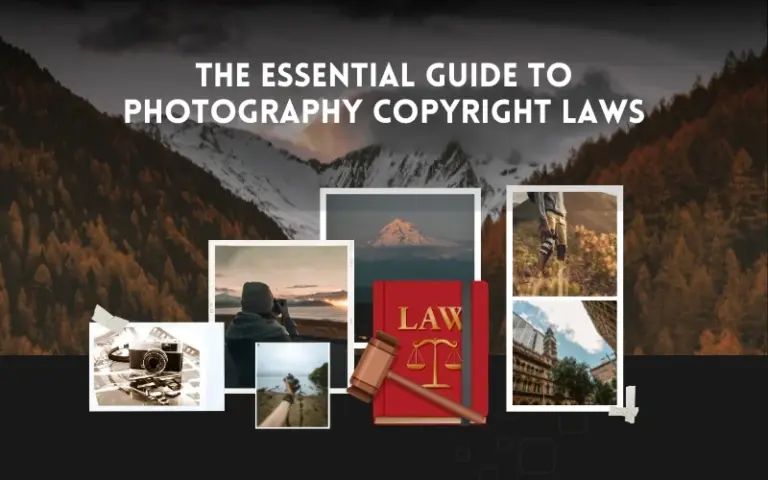Photography is an incredible form of art and expression. Most photographers have their portfolios set up in the form of a website. A photography website is a great way to expand your customer base.
Most times, we observe people complaining about copyright issues. Copyright is a legal framework that protects the intellectual property rights of creative works.

Photography copyright laws are critical for protecting a person’s or entity’s creative work. This framework ensures that it appropriately rewards the hard work artists invest in creating something unique.
In this article, we’ll explore the guidelines for creating photography copyright laws for your website.
Table of contents
Copyright Law To Photography
Photography is a form of creative expression, and copyright law applies to it just as it does to other professions.
When a photographer takes an image, they automatically become the copyright owner of that photograph. This ownership grants them the right to control the usage and distribution of the image.
Understanding how copyright law relates to photography is important for photographers to protect their creative work.
Understanding Ownership
Now, understanding who owns the copyright in a photograph can sometimes be more complex than it appears.
In most cases, the person who presses the camera shutter is the copyright owner. However, exceptions exist, such as in work-for-hire agreements, where the employer or commissioning party may hold the copyright for a photograph they’ve commissioned.
Knowing copyright ownership in photography is of utmost importance. This knowledge helps photographers to make informed decisions about how their work is used, whether for selling prints, licensing images, or protecting their work from unauthorized use.
Understanding copyright ownership is important in this rapid environment, where images can spread across the internet in seconds.
Copyright Registration
Registering photographs with the U.S. Copyright Office offers photographers numerous advantages. It gives a public notice, making it easier to prove ownership in legal issues.
Additionally, it allows photographers to seek statutory damages and attorney’s fees in cases of copyright infringement.
Licensing & Usage Rights
Licensing is a key concept in photography. Photographers can determine how their images are used.
Through licensing agreements, photographers specify the terms, such as where the image can be used, for how long, and for what purpose. Licensing is not only a measure but also a way to make money through creative work.
Photographers use licenses to protect their work and make income. By defining how their images can be used in various scenarios, photographers ensure that their work is not exploited and that they can benefit from its commercial potential.
Fair Use & Copyright Infringement
Fair use is a concept in the photography copyright laws that permit limited use of copyrighted material without seeking permission from or paying fees to the copyright holder.
In photography, this concept comes into play when someone uses an image for news reporting, education, etc. However, the boundaries of fair use can be nuanced and often require legal interpretation.
Copyright infringement occurs when someone uses copyrighted material without permission. Recognizing and addressing copyright infringement issues is vital.
When suspecting infringement, it is crucial to consult with legal experts to determine the best course of action, which may include issuing notices.
Protecting Your Photography Business
Running a photography business involves various legal considerations. This involves client agreements, tax responsibilities, and liability issues, among others.
Familiarizing yourself with these legal aspects is important for the smooth operation of your business.
Every website should include legal pages, such as Terms of Service and a Privacy Policy. These pages include how your website operates, what information you collect from users, and how the users’ privacy is protected.
They contribute to transparency and legal compliance, thereby respecting website visitors’ rights and data.
Having a clear copyright notice about your product and the regulations makes your website secure. Here, we’ll explore a WordPress plugin, WP Legal Pages, that can help you easily create copyright notices and other critical legal pages for your website.
WP Legal Pages Plugin
Ensuring copyright protection often begins with having clear and concise notices and disclaimers on your website. WP Legal Pages is a helpful tool that simplifies the creation of these notices. It ensures that your copyright ownership is effectively communicated.
WP Legal Pages is a user-friendly WordPress plugin designed to simplify the creation of required legal pages for photography websites. This plugin streamlines the process makes sure that your website is legally covered.
While you’re at it, don’t forget to grab these freebies to improve your photography:
Key Features Of The WP Legal Pages Plugin:
Some of the exceptional features that make the WP Legal Pages plugin popular are:
- Template Library: Access customizable templates for legal pages.
- Auto-Updating: Stay compliant with evolving legal requirements as the plugin automatically updates your legal documents.
- GDPR Compliance: Ensure your website adheres to data privacy regulations, which is important if you collect visitor data.
To ensure that your website is legally following rules, consider the following elements:
- Copyright Notices: Clearly state your ownership and usage rights on your website.
- Terms of Use: Define the rules for website users.
- Privacy Policy: Explain how user information you collect, use and protect visitor data.
With WP Legal Pages, these legal elements are easily added into your website, leaving you with a sense of relief.
How To Install WP Legal Pages Plugin
To install the plugin, follow these simple steps:
Head over to your WordPress dashboard. Hover over Plugins and click on the Add New menu.

Search for Wplegalpages in the search bar above.
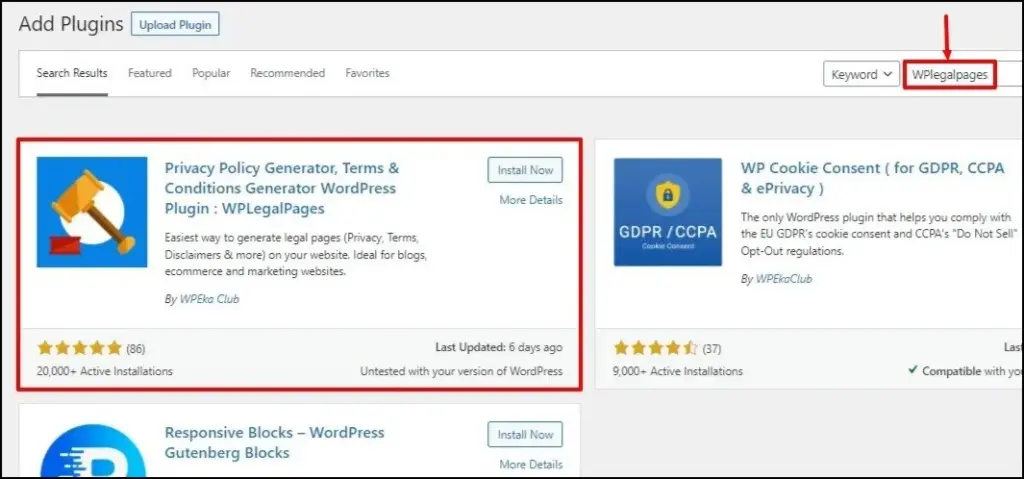
Click on the Install Now button.
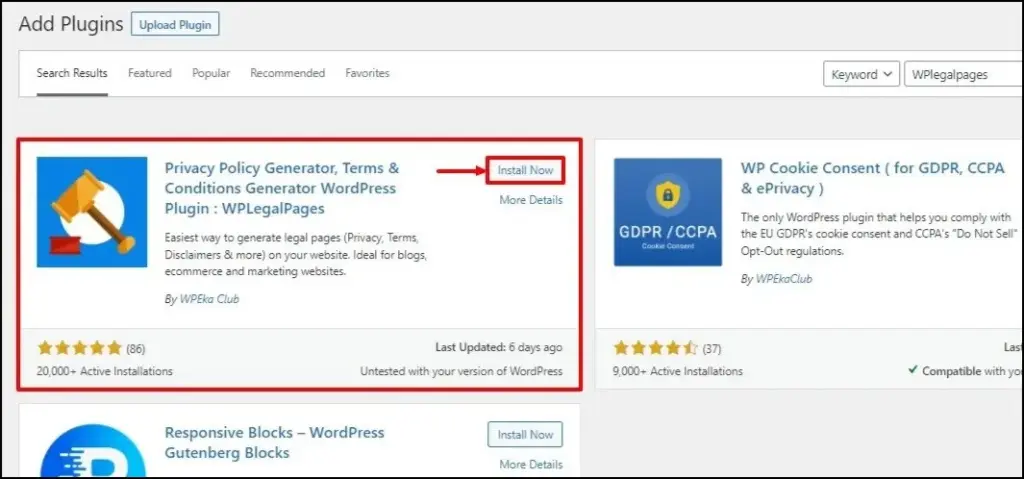
Next, click on the Activate button.
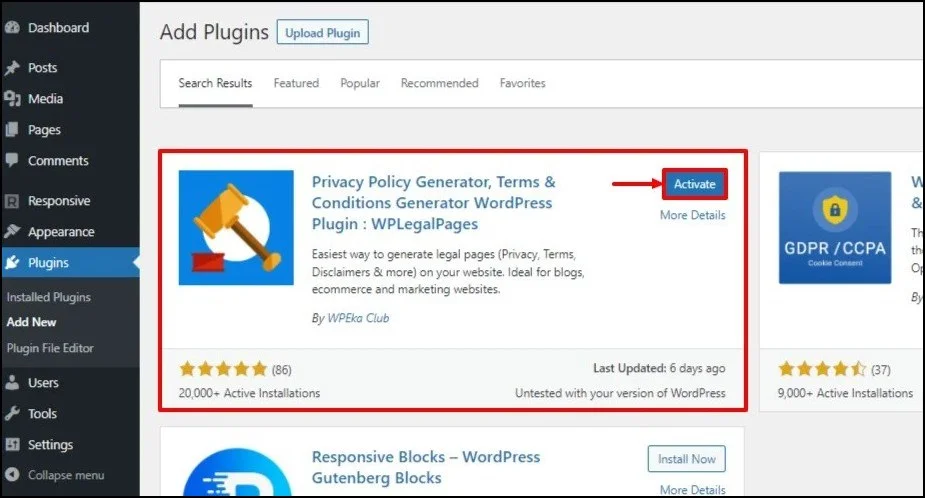
Next, accept the terms of use of the WPLegalPages plugin.
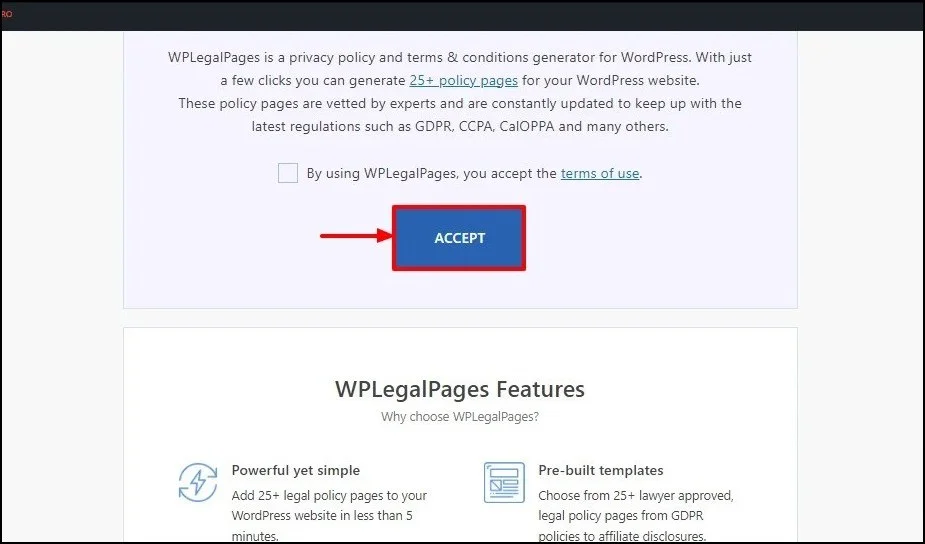
That’s it. You have successfully installed the WPLegalPages plugin. Next, we’ll show you how to create a notice page using the WPLegalPages plugin.
How to Create a Copyright Notice Using WPLegalPages Plugin
To create such a notice, in other words, a DMCA page, follow these simple steps.
After accepting the terms of use, click the Create Legal Page menu.
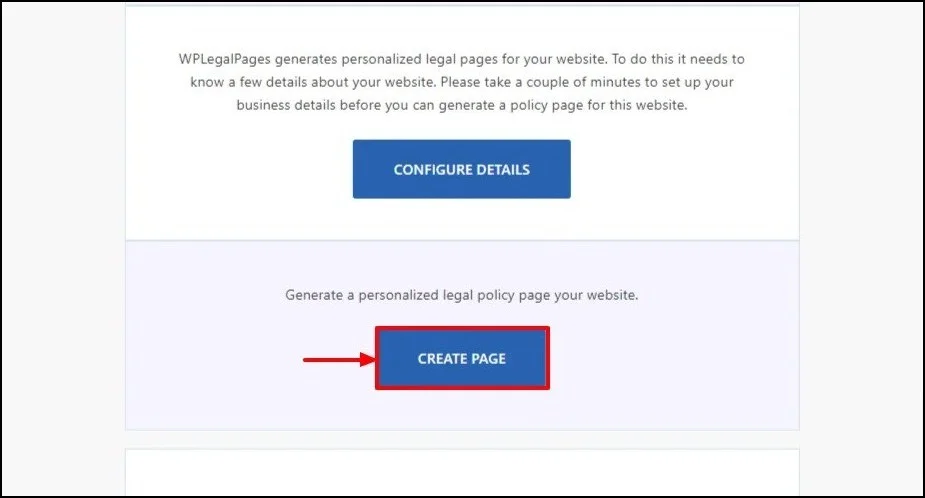
This will open the WPLegalPages wizard. From the WPLegalPages wizard, choose the DMCA template and click on the Create button.
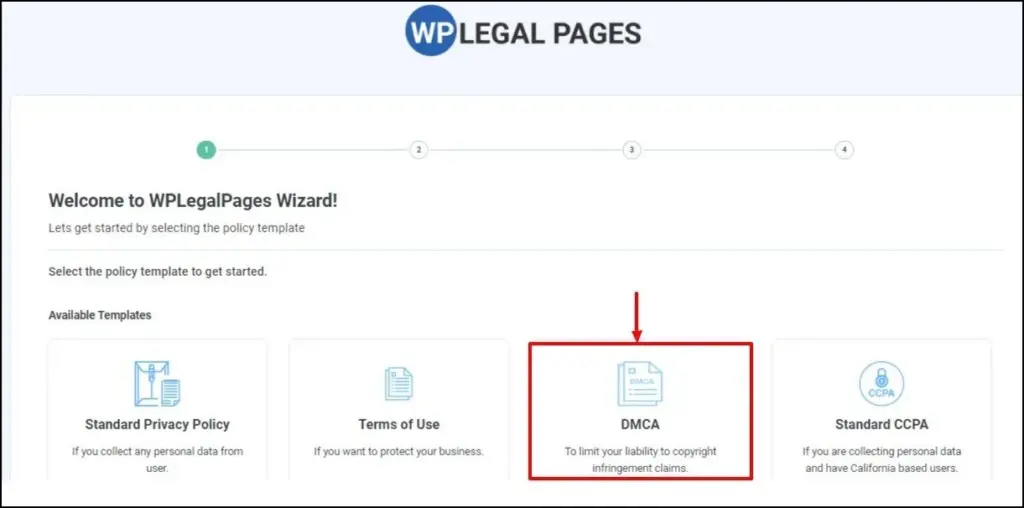
Next, fill in the Recommended Settings page fields and click the NEXT button.
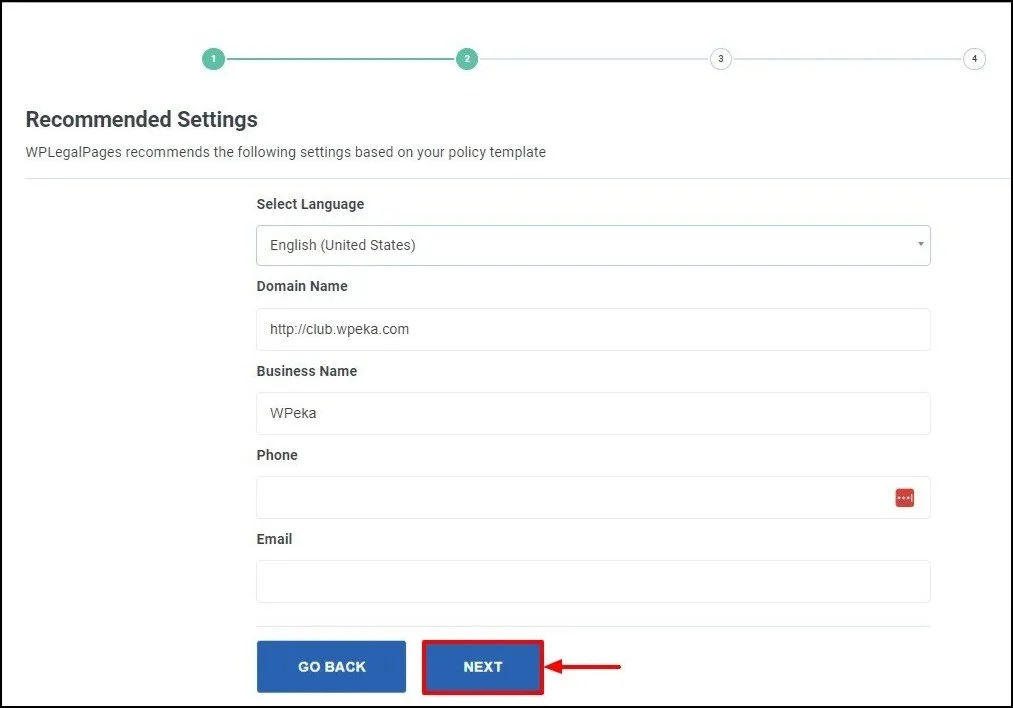
You can now check out the preview of the DMCA Policy Template page.
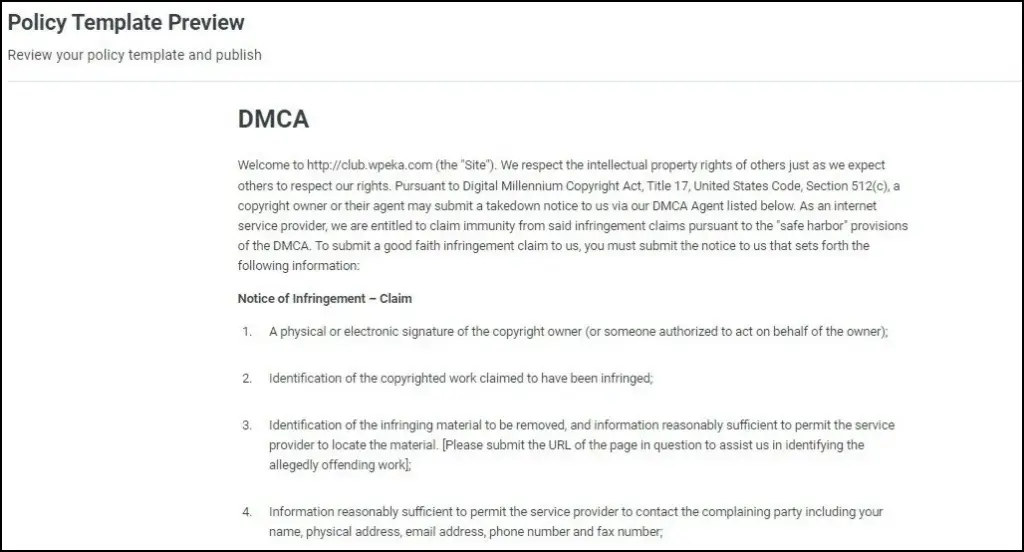
Once reviewed, click on the CREATE AND EDIT button at the bottom of the page.
This will open the WordPress editor.
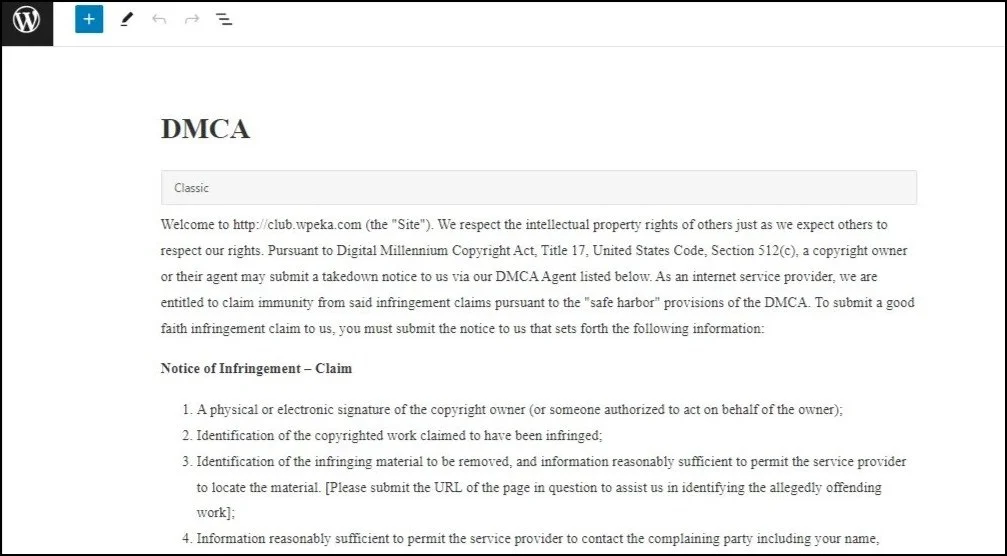
Review all the details in the editor again and click the Publish button.
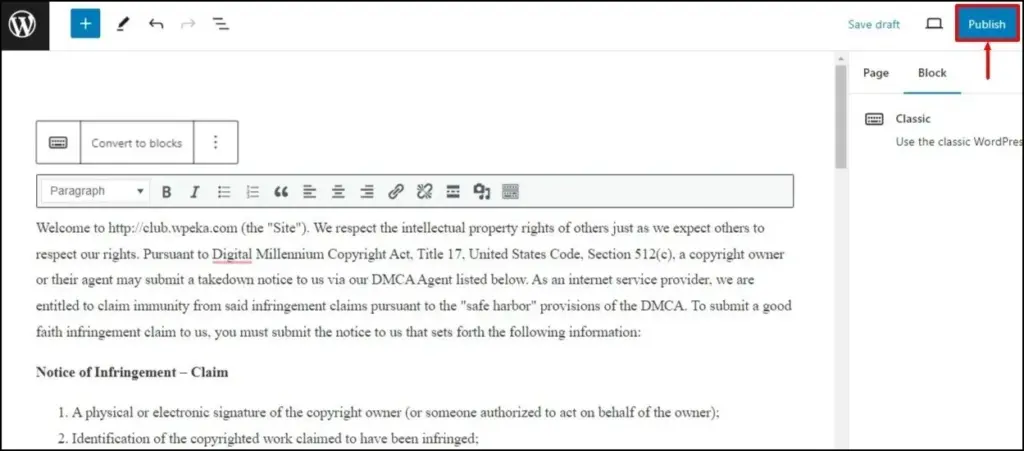
Once published, your DMCA Copyright Notice is ready for your website.
You can create many such legal pages using the WPLegalPages plugin, which will help secure your website.
Conclusion
Staying legally compliant with various laws, such as copyright law, GDPR, or even CCPA, makes it important for your users to trust your website.
Photography copyright laws are basic for protecting your website. It ensures that your website doesn’t have any issues.
As a photographer, you must understand the law and create a notice page that includes every part of your product. To do that, we recommend using the WP Legal Pages plugin, as you can easily create a DMCA legal page for your website.
If you’ve liked reading this article, don’t forget to check out our other articles:
- A to Z of a Photography Website
- Lesser-Known Ways To Market Your Photography Business
- How To Choose The Best Online Photography Course
Want to create legal pages for your website? Grab the WP Legal Pages plugin now!
